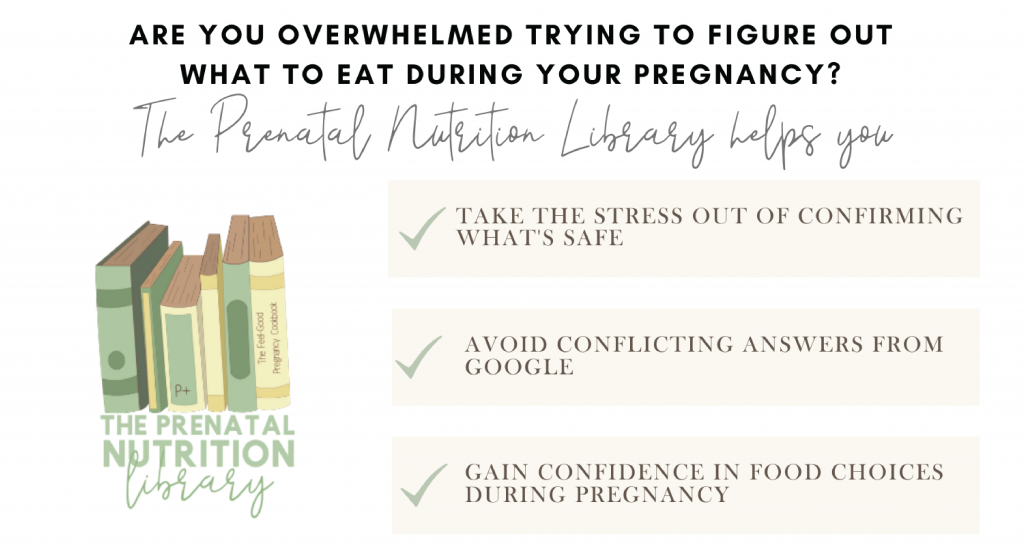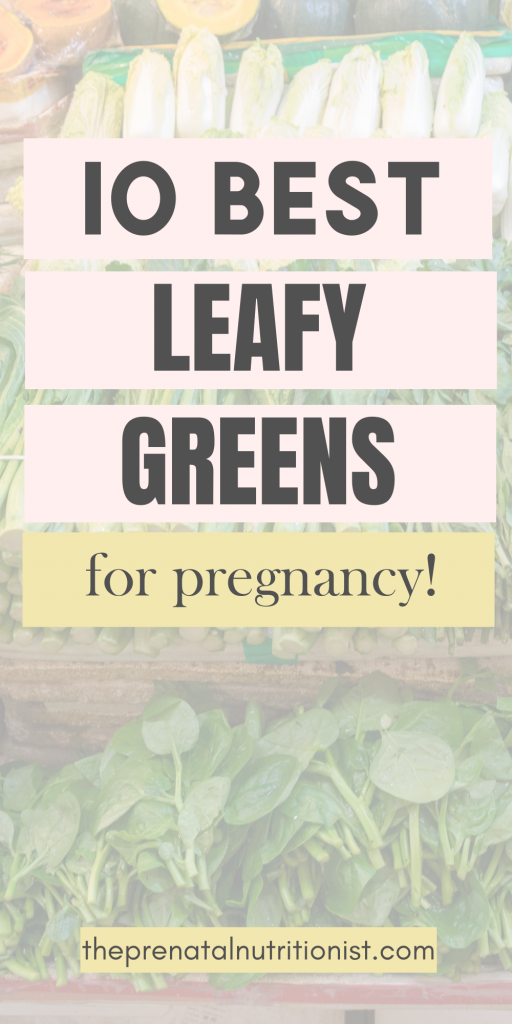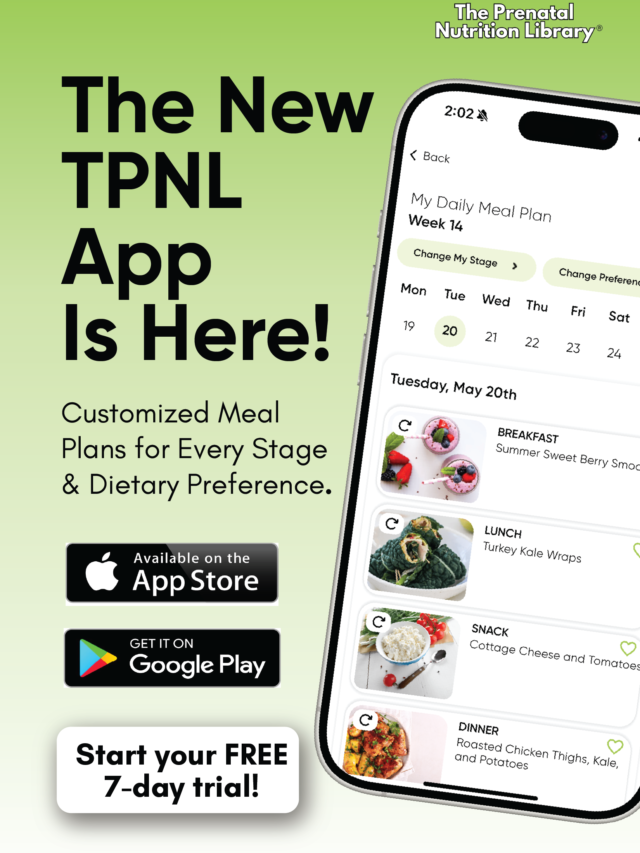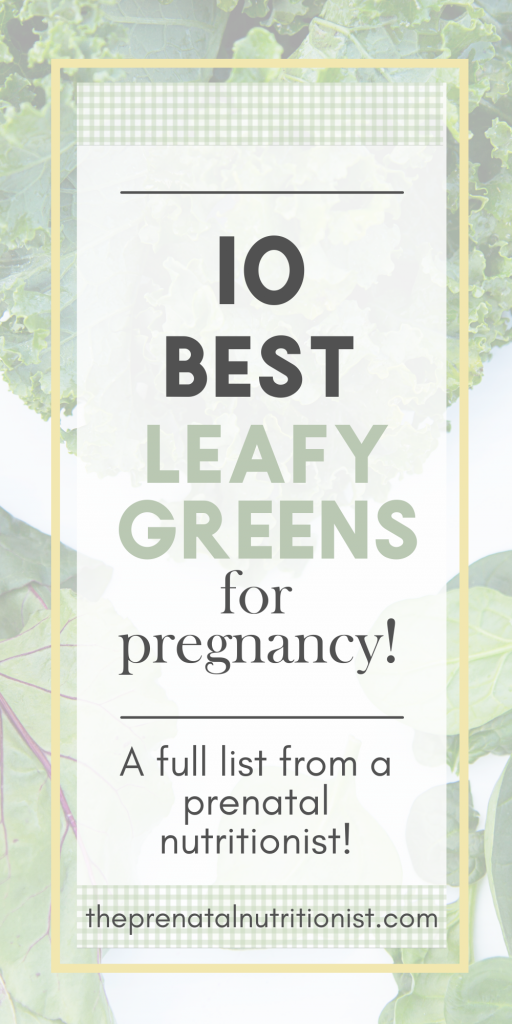
Everyone, especially pregnant women, should have a healthy diet and proper nutrition. The ease and health of your pregnancy can be influenced by what you put into your body, meaning consuming lots of nutrient-dense foods (like fruits and vegetables) is vital.
Green vegetables, especially leafy greens, are among the healthiest foods you can eat. They are versatile and packed with vitamins, minerals, fiber, antioxidants, and more. All of which are essential for a baby’s development.
Remember, there’s no ONE best food for pregnancy. Overall, diet is what matters most. If leafy greens don’t sound good right now (hello, first-trimester nausea), it’s okay to focus on our nutrient-dense choices! With that said, if these ten green vegetables are foods you enjoy, they have mega-benefits for pregnancy. So, enjoy our roundup of the best leafy greens to consume during pregnancy!
10 Best Leafy Greens For Pregnancy
Asparagus
Asparagus contains folate, fiber, and antioxidants, which all play an essential role during pregnancy. These nutrients are important for preventing neural tube defects and constipation and strengthening the immune system. There are many reasons to add these long green stalks to your diet today.
So, not a “leafy green,” these yummy green stalks are the perfect addition to any dinner entree or salad and can even be enjoyed as a snack. We couldn’t leave them off the list. For an ultra nutritious meal with tons of complimentary flavors, pair with grilled salmon and sweet potatoes – yum!
Kale
Kale is a cruciferous vegetable, similar to broccoli, cauliflower, and arugula. There are four main varieties of kale (baby kale, curly, lacinato, and red), each with distinct flavors. Consuming kale regularly can help you reach your recommended daily values of vitamins C and K, beta-carotene, and calcium. Beta-carotene is essential during pregnancy as it supports the immune system and promotes the baby’s eye and vision formation.
There are tons of ways to add kale to your diet. Use it as a base for a salad, add it to any soup, or use it in place of lettuce on sandwiches. Check out our comprehensive kale guide for more information about kale, including more cooking options.
Seaweed
Seaweed? YES, seaweed! Did you know that consuming seaweed during pregnancy is safe and recommended? Well, it totally is! The three main types of seaweed are brown, green, and red. It is a versatile, delicious, and nutritious addition to your pregnancy diet. The benefits of seaweed during pregnancy are wide-reaching, including everything from antiviral properties to DHA, EPA, omega-3 fatty acids (healthy fats), and plant-based protein.
Seaweed can be used in soups, as a bread or tortilla substitute, or eaten plain. Potential contamination of seaweed with heavy metals appears minimal when consumed in moderation! More on seaweed here.
Mustard Greens
Mustard greens are a one-stop shop for many of your essential B vitamins. These greens contain thiamine (B1,) niacin (B3,) and pyridoxine (B6). You’ll also get some vitamins A and K in there! Mustard greens are heart-healthy, energy-boosting, and can reduce the risk of severe pregnancy complications, including high blood pressure.
Make a mustard greens salad, blend them into your next green smoothie, or stir-fry the greens with a hearty protein. When mustard greens are cooked, they have more vitamin K and A but reduced vitamin C and E levels. It’s always best to consume a variety of foods in a variety of ways to maximize nutrition!
Spinach
Spinach is one of those leafy greens you either love or hate. In the case of pregnancy, we hope you love it because adding this veggie to your diet can have many benefits. Spinach provides fiber, plenty of non-heme iron, folate, and magnesium. It is also a non-dairy source of calcium. If you practice a non-dairy diet, leafy greens like spinach can make getting your recommended daily value of calcium much easier.
Whether you prefer your spinach cooked or raw, there are plenty of ways to incorporate it into your pregnancy diet. Try a spinach and pesto flatbread, or add it to your next omelet, salad, or soup. Spinach is also a great addition to any smoothie because other ingredients usually overpower the taste. This is especially true for fruit smoothies.
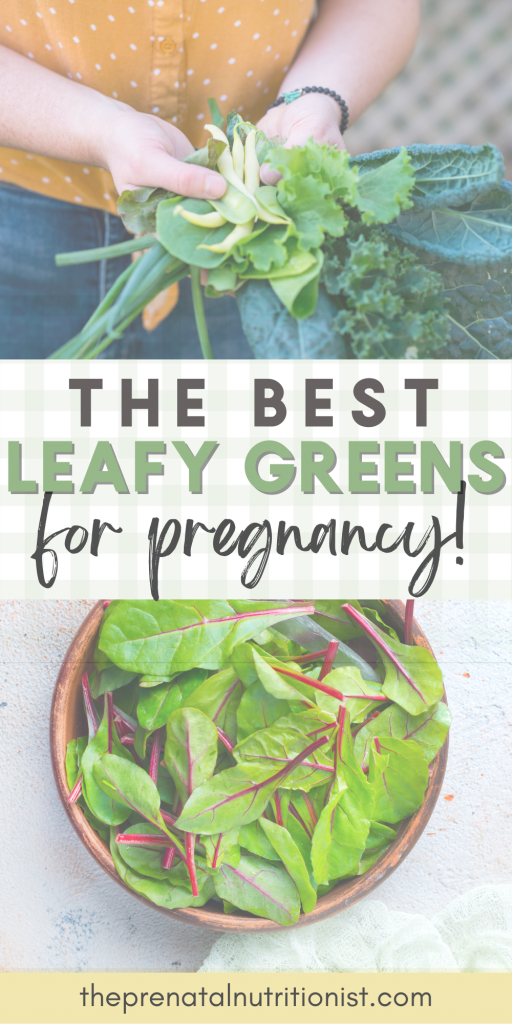
Broccoli
Broccoli is a super nutrient-dense vegetable recommended for women before, during, AND after pregnancy. It contains non-dairy calcium, fiber, folate, vitamin K1, and several anti-inflammatory properties. Getting plenty of vitamin K is suggested before giving birth, as this vitamin assists with blood coagulation and can reduce the risk of hemorrhaging for both mother and baby. So, keep broccoli on hand throughout your pregnancy, including in the third trimester and postpartum.
Fortunately, broccoli is one of the most versatile veggies on our list today! You can eat broccoli raw, roasted, baked, or stir-fried. Or, add it to your next creamy pasta, mac & cheese, rice, or omelet. Still, need a little inspo? Try this Lemon Roasted Broccoli or these Broccoli Cheese Bites. Keep in mind that broccoli sprouts are different from regular broccoli. Due to the higher risk of contamination, it’s best to avoid broccoli sprouts (or eat them cooked) and stick to regular old broccoli during pregnancy.
Swiss Chard
Swiss chard, originally from the Mediterranean, is full of vitamins, minerals, and plant compounds. There are several varieties of Swiss chard, some of the most popular being Bright Lights, Bright Yellow, Fordhook Giant, and Lucullus. Just one cup of these greens contains over 400% (yes, 400%) of the recommended daily value of vitamin K and over 55% RDA of vitamin A, 30% RDA of magnesium, and 30% RDA of vitamin C.
Swiss chard compliments eggs well, meaning it’s a great addition to your next scramble, frittata, or omelet. It’s also a great addition to any mixed greens salad, soup, or stew. Or, for a twist on your next pizza night, top your pie with Swiss chard and a mixture of other greens on this list, like spinach, broccoli, and kale.
Cabbage
Cabbage comes in three main varieties: green, white, and purple. This leafy green is an excellent source of several beneficial vitamins and minerals for pregnant women. They include but aren’t limited to vitamin K, folate, manganese, potassium, and magnesium. Cabbage also contains a great deal of vitamin C, making it an excellent immune-boosting food.
Cabbage’s sweet-bitter taste and crunchy texture make it a great addition to any soup or stew. Soups or stews with cabbage can be super beneficial after morning sickness. Cabbage is not only easy on the stomach but can be very replenishing to the body after bouts of morning sickness. You can find more on raw cabbage in the community forum of The Prenatal Nutrition Library.
Watercress
Watercress is a rich source of vitamins A and C but contains plenty of folate, calcium, magnesium, and vitamin E. As the name suggests, watercress is a good source of…water! This means consuming watercress regularly can not only provide plenty of nutrition, but it can help keep you hydrated as well. (For more tips on staying hydrated during pregnancy, click here!) This veggie can also help you lower your cholesterol, maintain a healthy weight gain, and keep your immune system strong and healthy to combat sickness.
Watercress can be used in place of lettuce on sandwiches and sliders and can give a whole new (and delicious) flavor to your favorite soups and stews. And like Swiss chard, watercress is an excellent addition to any meal with eggs. Think omelettes, frittatas, etc. This leafy green is also a great garnish on any fancy dish or appetizer.
Bok Choy
Also known as pak choi or pok choi, bok choy is a type of Chinese cabbage. With green leaf blades and bulbous bottoms, bok choy has a unique appearance and delicious flavor. Although it originated in China, it’s consumed widely globally because of its many health benefits. Benefits include heart-health properties, plenty of antioxidants, and multiple nutrients that support bone health for both mother and baby. Bok choy is a good source of vitamins C and A and contains trace amounts of folate, calcium, potassium, and magnesium.
Bok choy is easy to add to any pregnancy diet. Enjoy raw stalks of bok choy with dressing, or add it to your next soup or salad. If you’d like to cook bok choy in a traditional Chinese-cuisine fashion, try your hand making spring rolls, dumplings, or pot stickers.
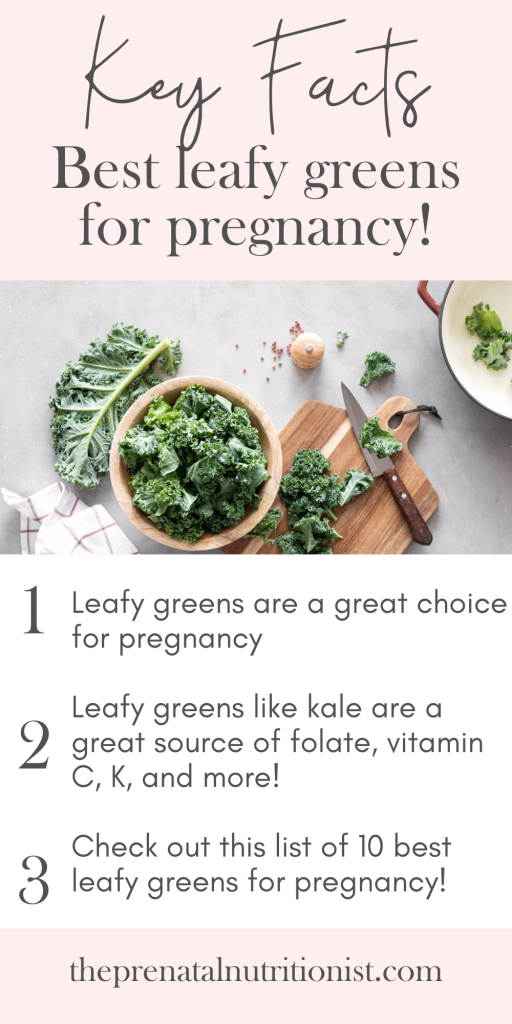
Leafy greens are chock full of vitamins, minerals, and antioxidants, making them a great addition to your pregnancy diet!
With so many nutrients and versatility, leafy greens should be a staple in your pregnancy diet from preconception to post-labor. And really, they are almost always beneficial to include in your diet. From providing many vitamins and minerals to protecting your heart and immune system, leafy greens are a great group of foods to include in your pregnancy diet. Remember, food safety is always crucial! The best practice is to buy full heads of lettuce, wash, and chop yourself at home.
For more on prenatal nutrition, tips on what to eat during pregnancy, recipes, and more, head to The Prenatal Nutritionist Blog. Each week, we release valuable content to guide you through each stage of preconception and pregnancy.
If you’re tired of all those conflicting Google answers to your pregnancy nutrition questions, sign up for The Prenatal Nutrition Library today! No more guessing or confusion…with a membership to our comprehensive library, you will gain confidence in all aspects of your prenatal nutrition and have peace of mind everything you are eating is safe and nutritious!
